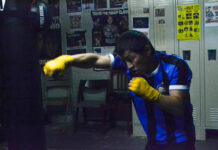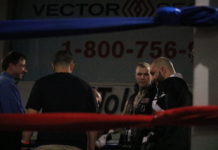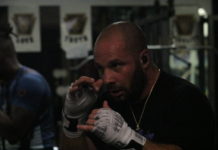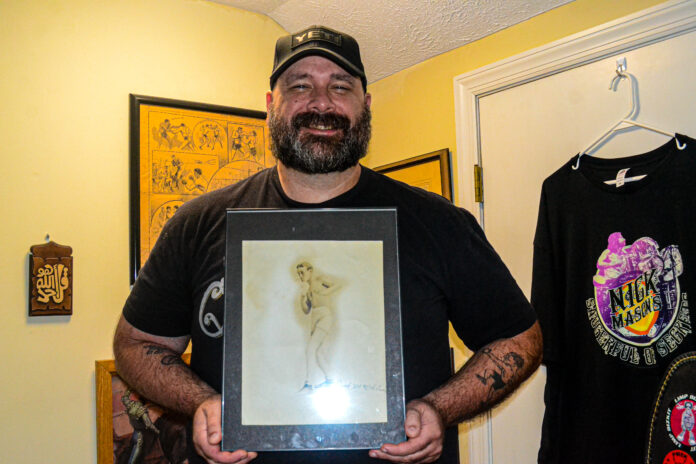
The past of the sport’s history in Pittsburgh is storied, but the history was scattered compared to other boxing hotbeds. Pittsburgh boxing’s history and legacy were lost to time in the archives of newspapers in Pittsburgh and other cities that covered those fighters.
Douglas Cavanaugh and Vincent Ciaramella captured the history of boxing in Pittsburgh in their books, “Pittsburgh Boxing: A Pictorial History” and “Jack McClelland: The Pride of Pittsburg.”
Cavanaugh from Burbank, Calif., has written about the historical figures of boxing since the ’90s. His articles received publication in boxing magazines like The Ring, British Boxing Monthly, World Boxing, and Boxing Illustrated.
He’s covered boxers from all over the world and noticed a trend in some of his favorite fighters.
“A rather disproportionate number of boxers that I liked happened to be from Pittsburgh, said Cavanaugh, so I thought okay, let’s go find a book on the subject.”
Major fight towns like Philadelphia, New York, Chicago, and Los Angeles documented boxing history through arcadia picture books. Pittsburgh despite the legendary history of guys like Billy Conn, Harry Greb, Fritzy Zivic, and Charley Burley.
“There was just so much information that had not been documented in Arcadia book wouldn’t have done it justice,” said Cavanaugh. “So, what I thought would be a six month to a year-long journey turned into something that took a decade.
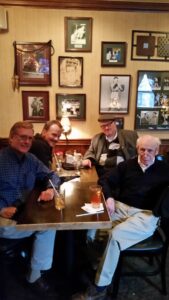
He started research in 2009 by posting his findings on a Facebook page. Over time, it started picking up steam in the years that followed. The late Roy McHugh, his friend, mentor, and a longtime sports columnist for the Pittsburgh Press and Post-Gazette, likened his efforts to find a lost civilization.
“It was worth the effort,” said Cavanaugh, who wrote the introduction and copy edited the post-humous release of McHugh’s “When Pittsburgh Was a Fight Town.” “It’s fun, the families enjoy it, I enjoy it, and it’s been a great journey.”
Vincent Ciaramella’s journey towards writing his book about Jack McClelland, his great-great-grandfather, wasn’t about finding a lost civilization. It’s more about finding out about a little known family member, like people who asked about their family’s boxing past on Cavanaugh’s Facebook page.
“Only thing I knew about him was I had a boxer in my family who fought on barges,” said Ciaramella of Bethel Park. “There was a lot of curiosity on my part. Who was this guy?”
He would search for information about McClelland from time to time. He even won an eBay auction for a collection of articles on Jack in 2013 for 13 dollars.
He did not start actively searching for information about the former fighter until 2015 while waiting for his wife, Erica, to give birth to Enzo, his son.
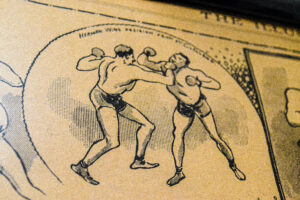
“I found an article Doug wrote about him on his page, and I decided to start gathering information,” said Ciaramella.
He managed to piece together details about McClelland’s career through newspaper archives and talks with family members like his aunt and a chance meeting with Shirley Quaquarucci, the granddaughter of McClelland.
“The book was to serve two purposes,” said Ciaramella. “Highlight his career and a family that had been forgotten.”
The book covers all of Jack’s life and career. From his days as an amateur to fighting 35 round fighting around the city during his heyday. Many of the places he fought were unconventional in today’s arenas and grand halls.
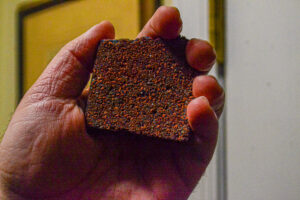
McClelland would fight in places like opera halls. To this day, only one building in Pittsburgh is still standing from his days of fighting, Maennerchor Hall in McKees Rocks.
Sometimes he would fight in tents, basements, and on a few occasions, barges that would float down the river. Fighting in the late 1890s to 1910s, it was an era where boxing was considered a brutal and illegal sport.
“They would fight with lanterns all around the rings in some places just to avoid the law,” said Cavanaugh. “I found a story about one fight that Jack held near a river, and the cops busted it. His opponent, Squirrel Finnerty, escaped by jumping out of a barge and swimming to Youngstown.”
Ciaramella covered the highs and lows of McClelland’s life both in and out of the ring. From defeating Abe Atell for the world featherweight championship at the 1904 Saint Louis World’s fair to having the title stripped away due to a technicality.
Checkered family life and questionable incidents with the law gave him some reservations about researching the book.
“I came to the part where he had a second family, and they were like starving, and the children were in rags in Allentown,” said Ciaramella. “As his career went on, he got a little weird.”
His run-ins with the law included child support issues, and some were altercations involving men of color. The latter issues were strange because fighting and training with boxers of color was no problem for Jack. Ciaramella has a theory that it was alcohol-related. Still, he can’t pin down what went wrong with “The Pride of Pittsburg.”
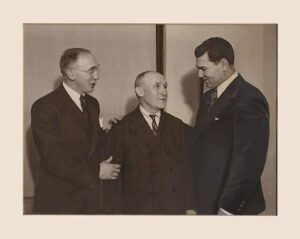
“He wasn’t the nicest guy in the world, nor the meanest,” said Ciaramella. “Shirley said she had never heard him utter any disparaging remarks against races or drink alcohol in his later years. It seems he shook whatever problem he had.”
Through their processes in writing their books, Cavanaugh and Ciaramella have become good friends. Erika helped with the formatting of Douglas’s text. In exchange, he would send Vincent received a couple of pieces on McClelland that he’d find during his research.
He calls their great bond with boxing in this city akin to two kids trading baseball cards in the schoolyard.
“He loves it as much [as anyone else around here],” said Cavanaugh. “You don’t meet people like that too often who are ingrained [with history] as much as you are.”
The two authors are already making plans for their next books. Douglas says a second pictorial book is in the works.
Vincent has finished another book, “Greats in The Graveyard: A Guide to All Baseball Players and Personalities Buried in Allegheny County. It will be released in December 2020 or January 2021.




